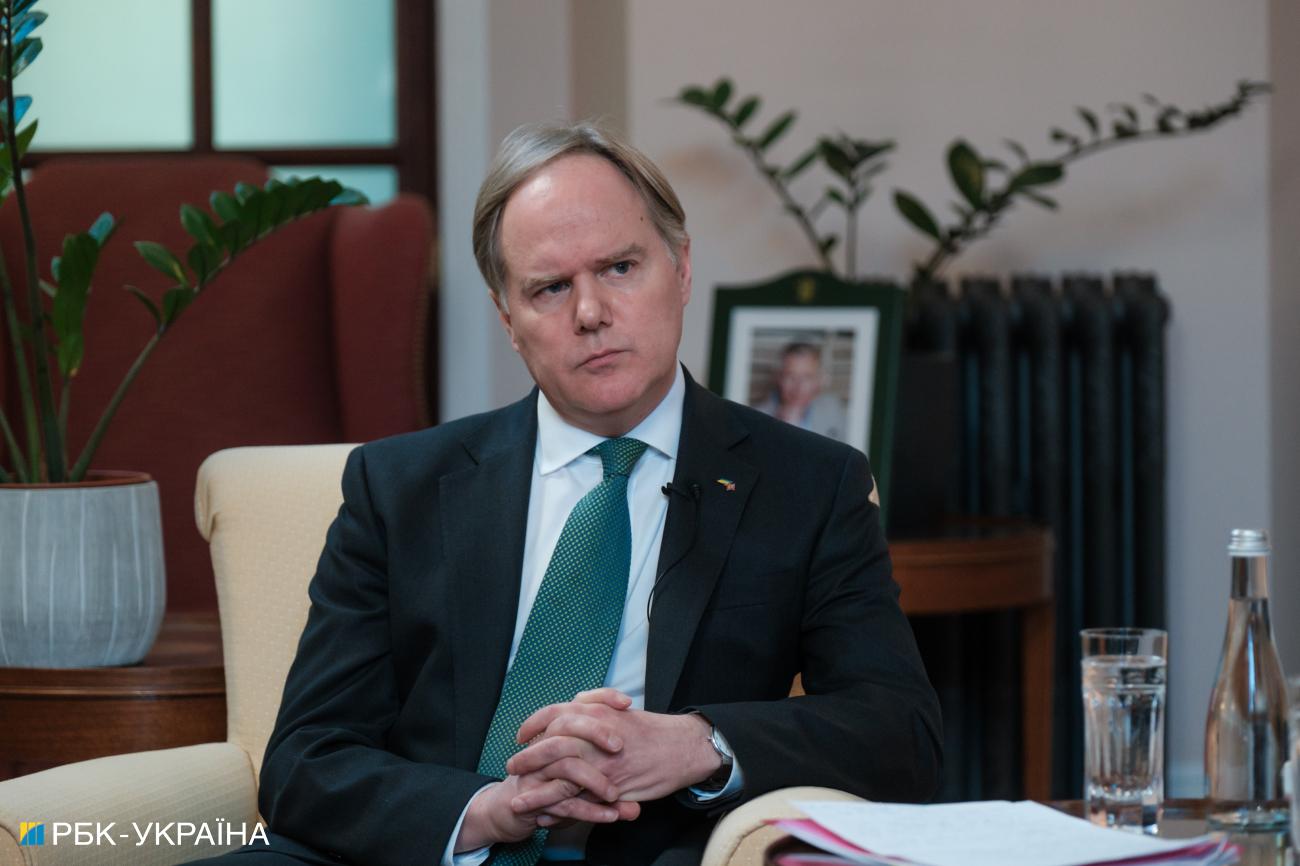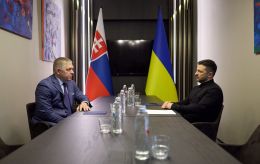British Ambassador Martin Harris: Russia gives no signal of a just peace
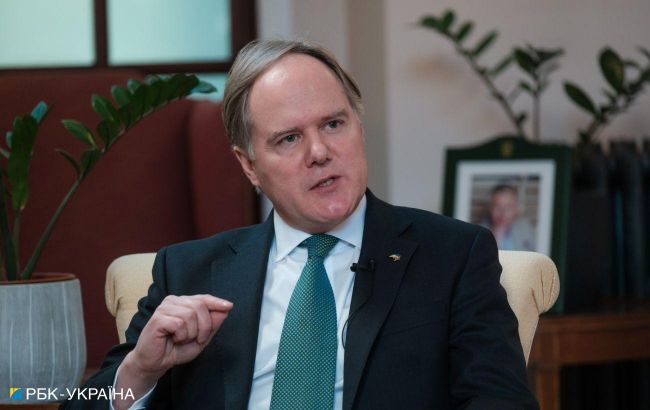 British Ambassador to Ukraine Martin Harris (all photos: Vitalii Nosach / RBC-Ukraine)
British Ambassador to Ukraine Martin Harris (all photos: Vitalii Nosach / RBC-Ukraine)
The end of the war and Ukraine's NATO accession, Zelenskyy's victory plan and the "century deal," the sentiments of the British public, and the Ukrainian language – read and watch the extensive interview with British Ambassador to Ukraine Martin Harris.
The coming weeks and months could potentially answer several key questions related to the war: Will it end by 2025? Under what conditions? Will Ukraine receive an invitation and subsequently membership in NATO? In what format will this take place?
RBC-Ukraine posed these questions to Martin Harris, the Ambassador of one of Ukraine's key allies, the United Kingdom. In his responses, Harris was diplomatically cautious. For instance, he declined to speculate on the possibility of a "hybrid" accession of Ukraine to NATO.
Instead, the ambassador consistently emphasized that peace must be "just" and "lasting". He also referred to the upcoming elections in the United States, noting that the new administration's policies in the White House will significantly influence the modalities of ending the war. "We will stand with Ukraine throughout the entire process of the administration change in Washington," Harris assured RBC-Ukraine.
Notably, at the ambassador's insistence, our conversation was conducted exclusively in Ukrainian — a language Harris began learning twenty years ago during his first diplomatic posting to Ukraine.
Below is the full video interview with Ambassador Harris and a shortened text version of the conversation.
— Why do you think there has been so much talk lately about so-called negotiated peace, meaning peace achieved through negotiations?
— First of all, I would like to emphasize that we support the fundamental principle that peace must be just and lasting for Ukraine. Recently, our Prime Minister met with the leaders of the US, Germany, and France, and there was a shared position that a just peace must be established in Ukraine.
Unfortunately, Russia continues its aggression against Ukraine. Russia is giving no signals toward a just peace. We need to support Ukraine’s initiatives now through both military and diplomatic means to achieve this just peace.
— Do you believe that this peace can be achieved if Russia does not voluntarily withdraw from Ukraine in one day?
— I think it is crucial not only for Ukraine but for the entire world. There are fundamental principles of the UN Charter, which include territorial integrity and the sovereignty of independent states. We support Zelenskyy's peace plan because it is based on these key principles of the UN Charter. These principles are not only important for the security of Ukraine or Europe but for the security of the entire world.
The fact that nearly 100 countries attended the Peace Summit in Switzerland demonstrates global support for these UN principles, and this must serve as the foundation for a just peace here in Ukraine.
— But we cannot talk about truly universal support for the peace formula or Peace Summits, as there are many influential players, such as China, that have a vision very different from ours. Do you think these countries could sway the Global South, and possibly even some European countries, to their side?
— I believe that all such countries should align with the UN Charter and its fundamental principles.
We have discussed this in our dialogue with China, India, and all members of the G20. Our position is to support Ukraine's peace plan.
There is also the fundamental principle that there cannot be a discussion about peace for Ukraine without Ukraine being involved. So, I think that through such diplomatic pressure, along with military pressure, we can influence Russia's position and achieve a just peace for Ukraine and security for Europe as a whole.
— You mentioned Zelenskyy's victory plan. Is this victory plan sufficient for Ukraine's success?
— I believe that this is a plan for a just peace. I think what President Zelenskyy is doing is right; he is developing a new strategy aimed at convincing Russia that military actions will not be effective.
I am very pleased that we had the opportunity to discuss these key principles when President Zelenskyy was in London, along with Prime Minister Starmer and the new NATO Secretary General. Now we can have a common strategy because we agree with the goal of the President's victory plan, which is to strengthen Ukraine's position by the end of the year.
There will soon be a new administration in the US, and we would like Ukraine to be in a strong position by that time, both militarily and diplomatically, as well as economically. This way, through collaboration with our partners, we can strengthen support for Ukraine.
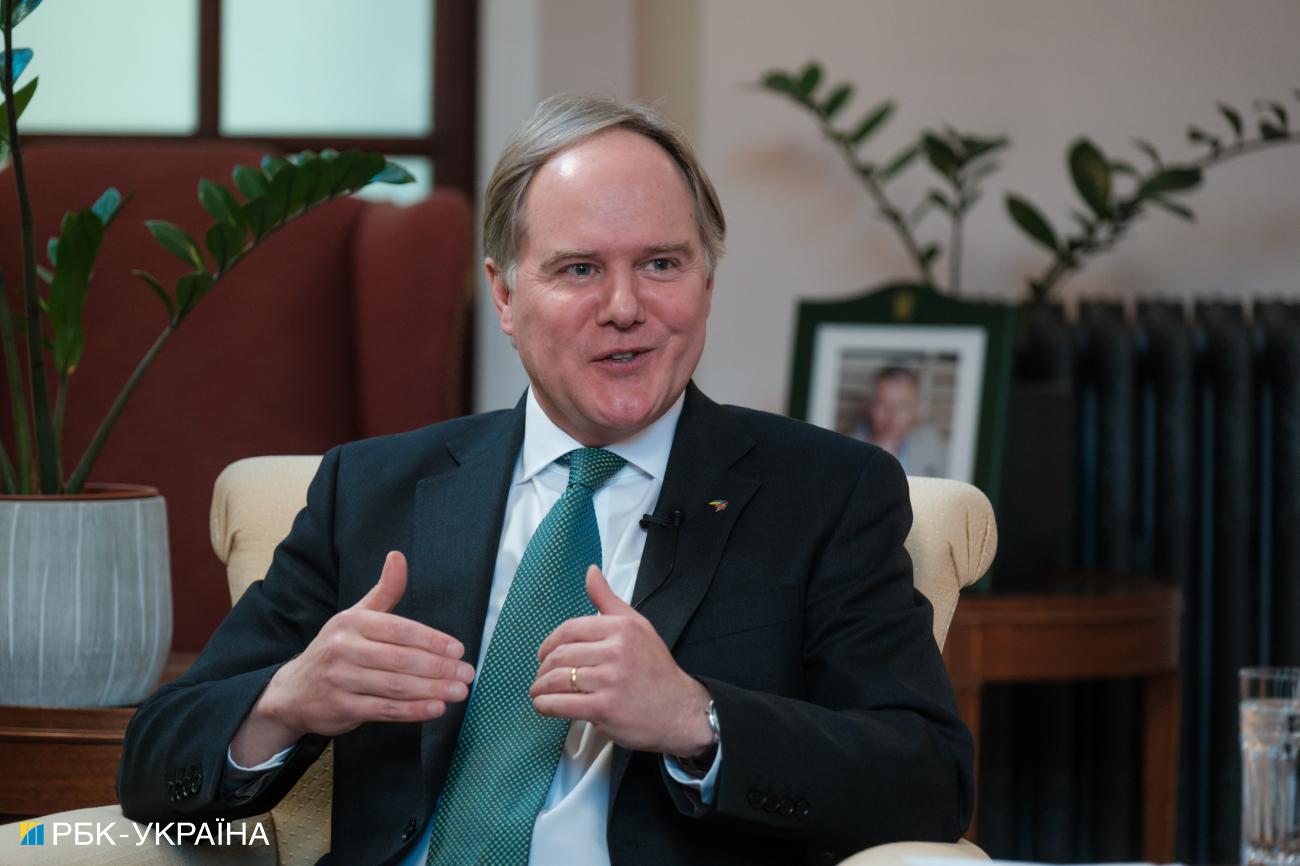
— President Zelenskyy mentions the possibility of ending the war by the end of 2025 with a just peace. Numerous Western media also write about the potential for the war to conclude next year. In your understanding, is it truly realistic to end the war in 2025?
— I believe that everyone here in Ukraine wants this horrific war to end as soon as possible. We also support Ukraine until victory and after victory. I know the position of the new US administration will be important, and we will stand by Ukraine throughout the process of the administration change in Washington.
I think there is no country closer to the US than the United Kingdom. And probably, there is no country closer to Ukraine than the United Kingdom. So we will be alongside Ukraine as we discuss with the new administration how to strengthen Ukraine's position to achieve a just peace.
– You place a lot of emphasis on the upcoming elections in the US. In your opinion, could this change in administration lead to a radical shift in positions and the balance of power regarding the war? Is it possible that after the change in administration, Europe and the United Kingdom, in particular, will have to take on a greater role in matters related to Ukraine?
— This process is ongoing now, with Europe, along with the US and all countries, strengthening support for Ukraine.
Today, I want to say that there is new support for Ukraine based on the fundamental principle that Russia must pay. Today, the British government announced a new loan for Ukraine amounting to £2.26 billion, equivalent to $3 billion, which will be funded by profits from frozen Russian assets. Ukraine does not pay for this loan; Russia pays for it. The British contribution will go into Ukraine's military budget, which means it will result in more air defense and more artillery.
Through this mechanism, Russia is indirectly paying for Ukraine's defense and new capabilities for the Armed Forces of Ukraine. This is a British contribution, but we also expect similar decisions from all our partners in the G7, with the total amount of this aid for Ukraine reaching $50 billion. So this is a huge support for the upcoming year to strengthen Ukraine's position and to uphold the principle that Russia must pay.
— In your opinion, can there be a stable and lasting peace if one side, Ukraine, or even both sides, remain extremely dissatisfied, feeling they haven't achieved their goals? Would such peace last long, or would it be a temporary ceasefire leading to a second or third round of conflict?
— I don’t want to speculate, as the main thing is that Ukraine must decide its future. At its core is Ukraine's independence and sovereignty.
However, I understand why it is very important in Ukraine for peace to be sustainable. We know that this war did not start 2-3 years ago but began 10 years ago. And here in Ukraine, as well as for security in Europe, peace must be just and sustainable.
— The leadership of the UK regularly communicates with the Ukrainian government. Is it true, as reported by many Western media, that Ukraine has become somewhat more accommodating in the issue of ending the war recently?
— Right now, Ukraine and the Ukrainian government are focused on President Zelenskyy's victory plan. This is a topic for discussion between our governments.
I would like to remind you that after the elections in the UK when Keir Starmer became Prime Minister, he promised President Zelenskyy that we would strengthen and accelerate our support for Ukraine.
I understand that sometimes questions arise: partners promised support, but have they delivered on those promises? Our Defense Minister has initiated a new process to ensure that what we promised is delivered to the Armed Forces of Ukraine. And all the military supplies we promised to expedite in July, with the new government in place, are now 95% in the hands of the Armed Forces.
We know the situation is critical, and partners must work quickly to support Ukraine. What we promised, we have delivered; we have made it happen.
— The United Kingdom has repeatedly taken the lead in making important decisions regarding assistance to Ukraine. For example, you were the first country to provide us with modern Western tanks. Are you also ready to take the lead in lifting the ban on strikes with Western weapons deep into Russia?
— This is a matter currently under discussion among partners and also with Ukraine. It is also one element of President Zelenskyy's victory plan.
However, this is not just about one weapons system or an operational issue. There is a broader strategy and overall situation to consider. A month ago, we announced new missiles for Ukraine — 650 new missiles to bolster air defense and protect Ukraine. It's also very important to enhance cooperation between Ukraine's defense industry and the UK's defense industry, as this opens up possibilities for joint weapons production.
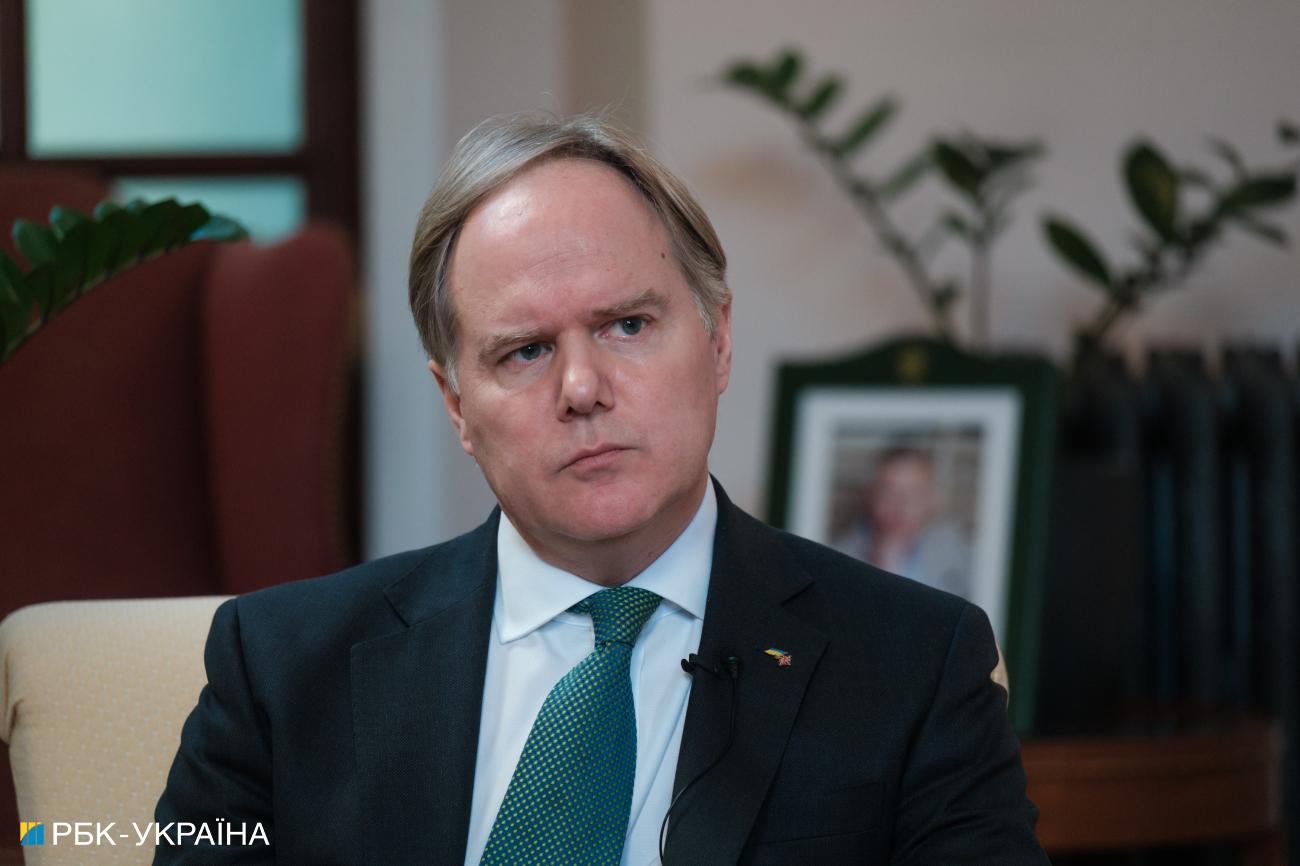
— Is the United Kingdom ready to similarly take on a leadership role in inviting Ukraine to join NATO? Not just to support it, but to actually be the leader, the driving force of this process?
— I believe this has always been the position of the United Kingdom regarding Ukraine's membership in NATO. We think that not only will Ukraine be in NATO, but NATO will also be stronger with Ukraine. I hope that victory in Ukraine will come soon. However, after that victory, I believe the threat from the aggressor to the security of Europe will remain. Our perspective is one of a future alliance with Ukraine, and that Ukraine will be a powerful ally for the United Kingdom within NATO to ensure the security of Europe.
— Is it possible for Ukraine to be invited to NATO before the war is over?
— Honestly, I don’t know when or how that might happen, but I am confident that the United Kingdom will stand by Ukraine and support it on its path to NATO. Ukraine is currently very close to NATO, especially through our operational cooperation.
— Does the United Kingdom consider the so-called hybrid membership formula for Ukraine in NATO viable, for instance, where the guarantees of Article 5 would not apply to certain territories, and no allied weapons would be stationed there, etc.?
— I think that is a question for the future, and it’s not something we should speculate on.
— Are the various security guarantee agreements that Ukraine has signed with the United Kingdom and many other countries able to somewhat replace NATO membership?
— It is stated in our treaty with Ukraine that this treaty is a pathway to NATO membership. It is not an alternative to NATO. I believe that the guarantee Ukraine should have is Article 5 of the North Atlantic Treaty.
Through the implementation of this agreement, we can be confident that it will bring closer the moment when Ukraine joins NATO.
By the way, we have also noted in the treaty that we will provide long-term support to Ukraine. Currently, we are the first country to provide all the funding for this. So, our position now is that we will give three billion pounds annually for Ukraine's defense until 2030, and as long as it is needed. Through this treaty, we also have financial resources that can ensure our cooperation, strengthen the Armed Forces of Ukraine, and all the capabilities important for Ukraine's future integration into NATO.
So, this is a real plan with funding and a treaty that is currently benefiting Ukraine.
I also want to emphasize that our perspective is about what comes after victory, looking ahead 100 years. We are currently in the process of negotiating a new treaty for a 100-year partnership.
— By the way, at what stage is this treaty currently, and when might it be signed?
— It is currently in progress. We have already had several rounds of negotiations with our partners from Ukraine, with representatives from various ministries. We have very strong relationships in the field of security, and this agreement will further strengthen our cooperation in this area.
However, there are many areas for collaboration between the United Kingdom and Ukraine, not just military. We would also like to enhance our cooperation in culture, technology, education, and economic sectors. There is now almost complete tariff liberalization between the United Kingdom and Ukraine for five years. So, we need to seize this opportunity and this unique partnership between our countries for other sectors of our relations.
— Do Ukraine's Western allies, particularly the United Kingdom, have a strategy to support Ukraine that goes beyond the formula of "we will support Ukraine as long as necessary, or as much as we can, or until victory"?
— Yes, there is a strategic vision that we would like to support and protect the sovereignty and independence of Ukraine. This is a fundamental principle of the UN Charter and the security of Europe after World War II.
It is very important to emphasize that we support the Ukrainian plan. We are for Ukraine's future. We will support Ukraine's vision because we uphold the key principle that Ukraine is a sovereign state.
The United Kingdom is a key partner of Ukraine, and we will work together to implement the Ukrainian peace plan.
— So the victory plan announced by President Zelenskyy is capable of forcing Russia to end its aggression against Ukraine?
— I think that is the goal — to strengthen Ukraine's position. And the concept is that there should be a joint strategy between Ukraine and its partners to achieve this objective.
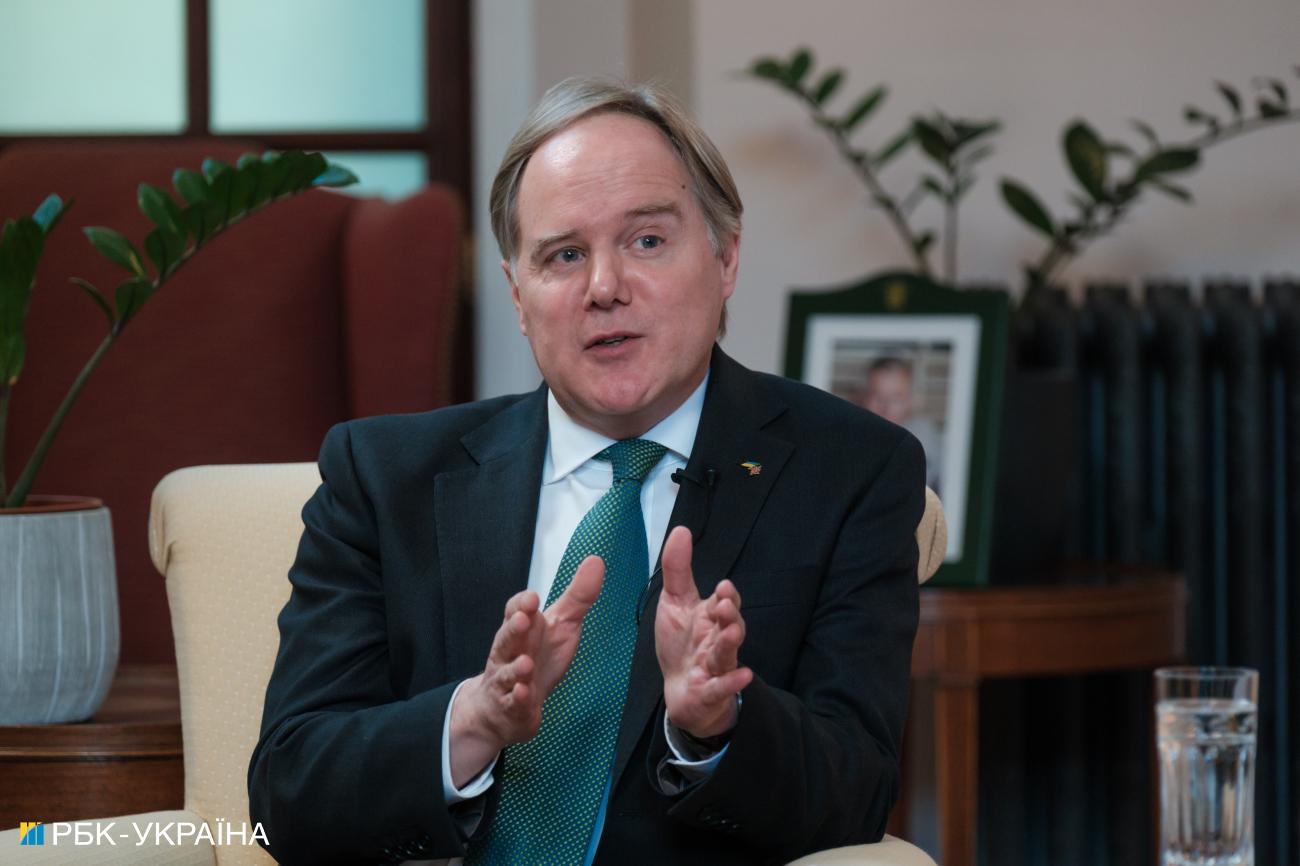
— In the early months of the full-scale war, there was a huge level of support for Ukraine in Western countries. Over time, we started to see a decline in that support, while some political forces promoting anti-Ukrainian slogans gained popularity, won elections, or showed very good results. What is the situation like in the UK?
— The high level of support for Ukraine remains strong in the UK. It is stable. In politics, all parties and all members of our Parliament support Ukraine.
And among the British people as well. I traveled to various places in the UK, including the Isle of Skye in Scotland, where we were on holiday with my family, and I saw Ukrainian flags there. All Britons now know about Ukraine, and many of them know Ukrainians personally.
So I think that the nature of British support for Ukraine is now also personal. And this opens up a new perspective for our relations in the future.
— To summarize, what kind of support should Ukraine expect from the UK in the foreseeable future, not just in the military sphere?
— You don’t need to wait for it because it is already here and now. We know, for example, that the Ukrainian government has set the goal for everyone to speak English. We believe that the English of the European version, i.e. the British version, is better.
We have already implemented a new program for teaching English to officials involved in the Eurointegration process. This is a new program from the British Council, and thousands of Ukrainian officials now have the opportunity to participate in it.
Another element is cultural relations. I believe this is a very important moment for them. I see a dynamic growth in Ukrainian culture; it is a true revival of Ukrainian culture in all its aspects. And now in the UK, everyone knows about Ukraine and is interested in your culture.
